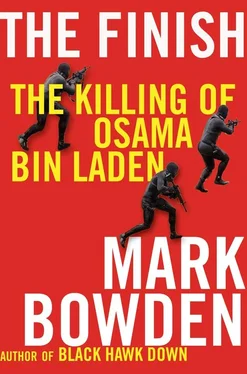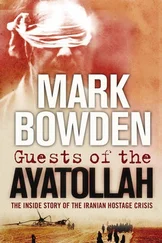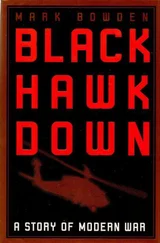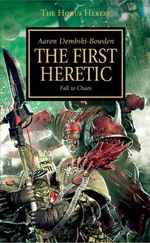“God willing, we want the Lion’s Den to be the first thing that the enemy faces,” bin Laden told a Syrian journalist. “Its place as the first camp visible to the enemy means that they will focus their bombardments on us in an extreme manner.”
And the Soviets obliged, dropping napalm and so many tons of conventional explosives that the outpost and the area around it were denuded of trees and vegetation. Then they attacked directly, encircling the outpost. The siege lasted for twenty-two days, with a heavy toll on both sides. Some of bin Laden’s men were more skilled fighters than he was. Abu Hafs (Mohammed Atef, an Egyptian policeman who would be killed in 2001) and Abu Ubaidah (Ali Amin al-Rashidi, also a former Egyptian policeman, killed in 1996) led punishing counterattacks. The Soviets eventually gave up and retreated, handing the Arab fighters an inspirational victory. It had unfolded for bin Laden miraculously, a clear sign from heaven.
He would later tell the Syrian journalist, “At seven on the twenty-seventh morning of Ramadan 1407 [April of 1987], most of the people were sleeping in the camp because it was Ramadan. Then I saw things that, by God, I have never seen before. A Soviet airplane, a MIG, I believe, passed by in front of us, when a group of our Afghan mujahidin brothers grouped together [and attacked]. The plane then broke into pieces and fell right in front of our eyes. This battle is what gave me the strong will to continue with this war.”
By all accounts bin Laden fought bravely, exposing himself to danger and the extremes of deprivation and cold like everyone else in the camp. He was injured during the fighting and, at one point, he later told an interviewer, he lay unconscious and bleeding in a trench, surrounded by his dead comrades. He was ultimately rescued, but only after losing a lot of blood, an incident that he would later say had given him chronically low blood pressure. Bin Laden’s willingness to place himself at risk greatly enlarged his reputation. It mattered little in the end that the battle had been meaningless in practical terms. The Battle of Jaji was proclaimed a great victory, and bin Laden, having conceived it, was its hero. Reporters trekked out to al-Masada to meet this Saudi multimillionaire who fought with suicidal conviction. One of them, Ahmad Zaidan, a Pakistani newspaper reporter working for a group of Arab newspapers, found an extraordinarily pious young man in complete command, who had supplanted the role once played by the far more famous Azzam, and who was surrounded by devoted followers. Bin Laden had transformed himself from a rich-kid backer on the sidelines into a frontline mujahidin leader.
It brought him more than new recruits. It affirmed his sense of destiny. By then he had become the Sheik. He was thirty years old, tall and thin, with long full features and a long dark beard that further elongated his face. He preferred traditional Arab robes and cultivated a lofty, saintly mien, affecting abject humility. He was theatrically holy. From time to time he would receive audiences of reporters, and after each question he would sit silently for a few moments, mouthing prayers, as if waiting for the Almighty to formulate the response for him, and only then would he speak, in a voice so soft that everyone had to lean close to hear him. He fasted once or twice a week and rejected the simple comforts and conveniences of modern life that he could easily afford. He shunned electricity, doing without air-conditioning and refrigeration in even the warmest climates, as when he and his family lived in the Sudan. All the better to harden himself and his family for the privation of war, for life as a fugitive. Followers were now drawn to his renown, to his sincerity, to his daring and his conviction, but also to his money. His fortune was still key. For those who had experienced the heady days of jihad in Afghanistan and preferred to make a career of it, bin Laden could provide the means, and possessed the reckless vision. For most Arabs the caliphate was ancient history, but to the Sheik it was destiny. God had chosen him. Surviving the bitter Russian siege at Jaji reinforced those beliefs. Qutb had called for a pure Muslim state, a base from which to spread the cause. Afghanistan seemed to be the place. It had been called Khorasan when it was converted to Islam in the seventh century and had stood as one of the great pillars of the caliphate for centuries. Defeating the Soviets there would have deep resonance among believers. It was, perhaps, the right place. And in bin Laden’s mind, it had started at al-Masada, where the pure of heart, outnumbered and outgunned, had righteously defied Soviet MIGs and bombs and weeks of determined assault.
Then the impossible happened. Just as they had backed away from al-Masada, in 1989 Russian armies retreated in frustration from Afghanistan. Within three years, the Soviet empire itself collapsed, closely followed by the regime it had left behind in Kabul. Bin Laden returned to Saudi Arabia with an outsized reputation as author of this titanic accomplishment, and he gained even more disciples. He and the men who had fought with him at Jaji saw themselves as the fulcrum of this triumph and named themselves “the Base,” or al Qaeda. They were the soul of what bin Laden saw as the emerging caliphate, a true Muslim Nation.
It was, of course, absurd. If anything, the source of the mujahidin ’s triumph had been the billions of dollars of U.S. aid and arms that Michael Vickers had helped steer to Afghanistan after the Soviet invasion. But bin Laden was less interested in the truth than in appearances, and in the latter, he and his followers excelled. Their style spoke volumes. Their long beards and hair and prayer caps and robes made them seem like men from an ancient, holier time. They adopted bin Laden’s asceticism. They embraced struggle and death, bragging that their desire for martyrdom trumped their attachment to life itself. They pitted themselves against power. They were natural men, real men. Their very shabbiness advertised their authenticity. They were pious. They believed that happiness and justice were not things civilization was evolving toward, but things that had been lost.
The fall of the Soviet Union had many causes, of course, and the drawn-out humiliation in Afghanistan was certainly among them, but for the devout there was only one cause: the hand of God had once more moved clearly in human history, just as it had in the legends of old. No serious scholar would credit bin Laden with a critical role in the effort, much less a role in the collapse of the Soviet state, but in the Sheik’s mind that was how it had gone. It made for a great story, the powerless but pure of heart overcoming impossible odds. The Sheik loved stories like these. He was a poet himself, a fantastical one, given to cosmic sweep and romantic cliché. He celebrated violence and death in the struggle to defend the faith, with centuries-old imagery of swords and steeds, soaring mountains, and fearless warriors.
He hunches forth,
Staining the blades of lances red.
May God not let my eye stray
From the most eminent humans,
Should they fall.
As the stallion bears my witness
That I hold them back,
My stabbing is like the cinders of fire
That explode into flame.
He used his poems to explain, excite, and recruit in parts of the world where traditions were still tribal and oral, but the poems were also an expression of how he saw himself, how he believed the world to be. As a younger man he had composed and recited his poems at weddings and other occasions. He was stitching his own life and his modern struggle into images of a glorious past. The Sheik often enclosed verses in his letters, and instructed that they be read on important occasions—published or broadcast. The Afghanistan victory brought the ages of heroes and mighty deeds to life in modern times. In his poetry, he was arguing that we, too, live in an age of miracles.
Читать дальше












